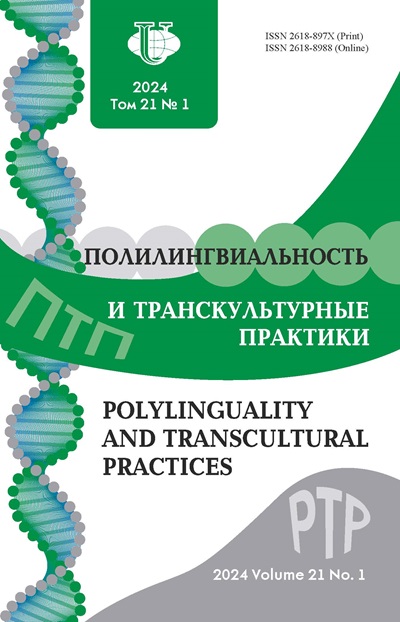No 5 (2008)
- Year: 2008
- Articles: 18
- URL: https://journals.rudn.ru/polylinguality/issue/view/198
Articles
 5-10
5-10


PARAMETERS AND CHARACTERISTICS OF EDUCATIONAL ENVIRONMENT OUTSIDE RUSSIA
Abstract
The article considers difference between studying Russian as foreign language within and outside linguistic environment. The article also proposes parameters to characterize this type of education, illustrated with live examples.
Polylinguality and Transcultural Practices. 2008;(5):11-16
 11-16
11-16


 17-23
17-23


THE ANTHROPONYMIC SYSTEM OF E.A. PROULX’S ACCORDION CRIMES: IDENTIFICATION AND SOCIALIZATION ASPECTS
Abstract
The paper studies a literary character as a bearer of a name in the context of anthroponymic transformations by the example of immigrants’ names in E.A. Proulx’s Accordion Crimes . The writer shows that name changes manifest themselves in immigrants’ struggle for their identity and socialization in a foreign language society, and reflect an individual’s intention of becoming a part of a new culture and a new society and changing an immigrant’s perception by others.
Polylinguality and Transcultural Practices. 2008;(5):24-30
 24-30
24-30


CLAUSAL COORDINATION TYPES IN ITALIAN AND RUSSIAN
Abstract
The present paper aims at defining the preferred usage in constructing sentences with time, cause and purpose clauses in Russian and Italian. The major difference between the languages lies in the degree of their explicitness, in the choice between syntactic coordination and subordination.
Polylinguality and Transcultural Practices. 2008;(5):31-39
 31-39
31-39


 40-46
40-46


 47-49
47-49


 50-53
50-53


 54-63
54-63


 64-68
64-68


LINGUACULTURAL ADAPTATION OF FOREIGN STUDENTS TO THE PROCESS OF THE LANGUAGE TEACHING IN THE LANGUAGE SURROUNDINGS: ITS SOCIAL-PSYCHOLOGICAL ASPECT
Abstract
This article deals with the problem of foreign students’ adaptation to the teaching process in the language surroundings in terms of sociology, psychology, ethnopsychology end the theoriy of intercultural communication. The concept of linguacultural adaptation of foreign students in the course of the Russian language teaching process is defined. The ways of its realization are determined.
Polylinguality and Transcultural Practices. 2008;(5):69-75
 69-75
69-75


FUNCTIONAL CHARACTERISTICS OF YOUTH SLANG UNITS IN YOUTH EDITIONS
Abstract
The article is devoted to the investigation of main peculiarities of youth slang units functioning in modern youth printed editions. Classification of mass-media is offered. Influence of the genre factors on youth slang units functioning is under special analysis.
Polylinguality and Transcultural Practices. 2008;(5):76-81
 76-81
76-81


 82-87
82-87


THE CONCEPT OF SCIENTIFIC AND METROLOGICAL STRUCTURE OF THE OBLIGATORY PROGRAMS FOR FOREIGN STUDENTS OF PREPARATORY FACULTIES
Abstract
The article focuses on topics of education in the field of teaching Russian for beginners. The concept of scientific and metrological structure of the obligatory programs for foreign students of preparatory faculties is proposed as system of tools for foreign students.
Polylinguality and Transcultural Practices. 2008;(5):88-92
 88-92
88-92


LINGUISTIC AND CULTURAL ANALYSES OF RUSSIAN FRAZEOLOGICAL UNITS WITH THE SOMATIC MEANING INCLUDING ARCHAIC COMPONENT
Abstract
This article is devoted to the linguistic and cultural investigation of Russian frazeological units with somatic meaning including archaic component, which reflect the originality of Russian speech. Their structure, communicative value and linguodidactic potential are under analyses.
Polylinguality and Transcultural Practices. 2008;(5):93-96
 93-96
93-96


 97-101
97-101


USING THE STRATEGY OF EXAGGERATION IN THE COMMUNICATIONS
Abstract
The article deals with the problem of linguacultural transfer which follows the process of intercultural communication and revealing the ways of its overcoming at realization of speech acts: gratitude, a compliment, an apology, an estimation, etc.
Polylinguality and Transcultural Practices. 2008;(5):102-107
 102-107
102-107


OUR AUTHORS
Polylinguality and Transcultural Practices. 2008;(5):108-109
 108-109
108-109















